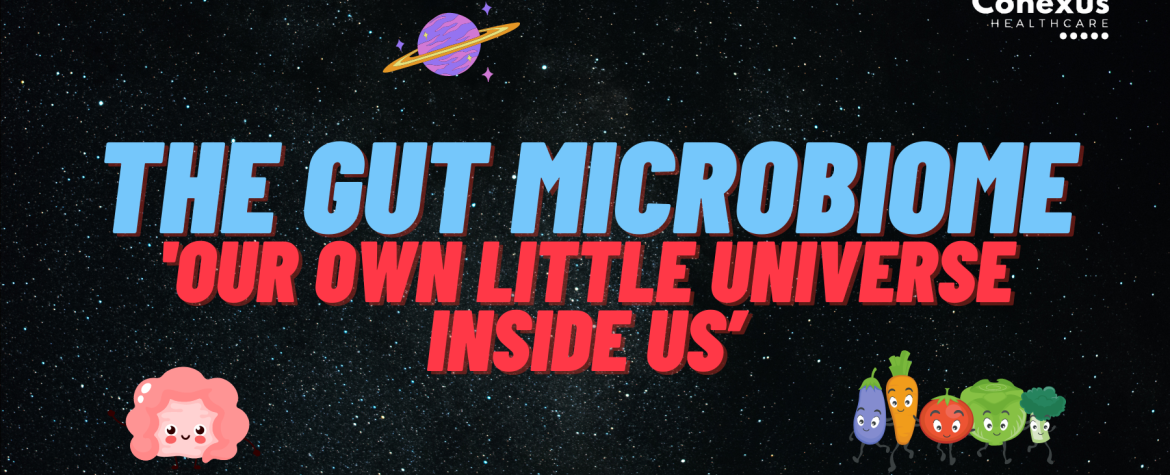Digestive Health Series- The Gut Microbiome ‘our own little universe inside us’
These next 2 blogs are going to be all around gut health, what is gut health, why gut health plays a vital role with our health and how most of us can improve our gut health. Let’s start with bacteria. Universally thought of as something bad, however, some bacteria and some other microorganisms, called ‘microbes’, can be good. Fun fact, there are as many microbes on your thumb as there are people in the UK! However, most of the microbes on us actually reside within our digestive system, specifically, our colon that makes up most of our large intestine. Inside your colon are 39 trillion microbes. That is a monumental number! If you take our galaxy, the Milky Way, and add up all the stars from our galaxy, then compare that to the number of living microbes in your gut. You’ll have 100 times more living microbes in your gut compared to 10 Milky Way galaxies!
What is the gut microbiome?
If you’ve seen Men in Black 2, you might recall the scene with the train locker, and inside this locker was another universe where lots of tiny beings lived- “All hail Jay! All hail Jay!”. If you didn’t giggle, google it and you’ll understand what I mean. This is a good way to think about what is living within your digestive system. Inside your large intestine are many different types of bacteria, viruses, parasites and fungi all co-existing peacefully. Collectively, when referring to their genetics, these microorganisms are known as the gut microbiome, when referring to the different types of these microbes, they’re known as the ‘gut microbiota’.
We want balance!
Your microbiome should contain mostly microbes that promote health (symbiotic), where both we, and our little gut bug friends’ benefit. However, our microbiome also contains microbes that have potential to damage our health (pathogenic). In a healthy individual, these symbiotic (good) and pathogenic (bad) microbes coexist peacefully, maintaining a healthy balance of digestive health. But this healthy microbiome balance can be disturbed and whacked out of balance by illness, infection, stress and diet. This imbalance is known as dysbiosis.
Dysbiosis can be classified where there is a loss of balance to the microbiome. As a result, you have less of the good anti-inflammatory microbes and more of the evil, angry pro-inflammatory microbes. Dysbiosis can affect our health and risk of infection, illness and other health complications. Hippocrates once said, “all disease begins in the gut”. The gut microbiome has many ways it affects our health.
How does the microbiome affect our health?
Research has suggested that higher microbial diversity (wide range of gut microbe species) is better for your health. All living things need to ingest food to survive and grow. As these 39 trillion microbes are inside your gut, what you eat, is what they eat! If microbes could go to Pizza Hut, they would skip the pizza and dive into the unlimited salad bar. “Why!?” you ask. They go crazy over Fibre. Where is fibre found…. Plants! When the gut microbes indulge in a fibre feast, they break these fibres down and release ‘short chain fatty acids’ (SCFAs). As a result of eating fibre and the production of SCFAs, the gut microbiome influences many aspects of our health, including:
- Immune system. Fun fact- around 70% of your immune system resides in your gut!
- Brain health. Through the Vagus nerve, the microbiome can signal to the brain to reduce inflammation, improving cognitive function and reducing the risk of neurodegenerative diseases.
- Metabolism and weight. Higher diversity of gut bacteria is associated with less weight gain and improved metabolism.
- Reduce risk of cancer and systemic disease. Higher diversity of gut microbes and the production of SCFAs help protect the lining of your intestines by reducing inflammation, helping prevent bacterial endotoxins leaking out and causing damage to your wider system.
We have a symbiotic relationship with our little gut bug friends. If we look after them, they look after us! The best way to keep the trillions of microbes happy is to feed them what they want! Fibre. Ingesting a wide range of plant sources means you get all types of fibre, therefore supplying the trillions of different microbes with an all you can eat buffet so they can pick what meal they want. This results in promoting a healthy, diverse gut microbiome and in turn a healthier us!
More plants team, more plants!
Author: Paul Rudd, Health and Wellbeing Coach at Trinity Health Group PCN

